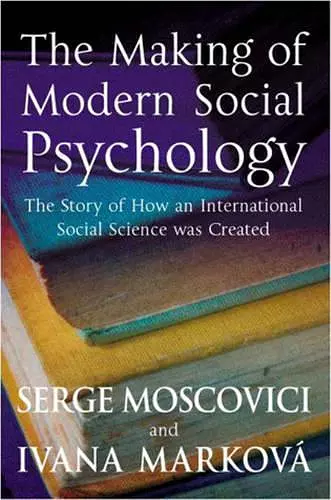The Making of Modern Social Psychology
The Hidden Story of How an International Social Science was Created
Ivana Marková author Serge Moscovici author
Format:Paperback
Publisher:John Wiley and Sons Ltd
Published:10th Aug '06
Currently unavailable, and unfortunately no date known when it will be back

This fascinating book makes an important contribution to the history of the social sciences. It tells the largely hidden story of how social psychology became an international social science, vividly documenting the micro-politics of a virtually forgotten committee, the Committee on Transnational Social Psychology, whose work took place against the back-drop of some of the most momentous events of the twentieth century. Overcoming intellectual, institutional and political obstacles, including the Soviet invasion of Czechoslovakia, and the military coups in Chile or Argentine, the committee struggled to bring social psychology to global recognition, not as part of a programme of intellectual imperialism, but motivated by a mixture of intellectual philanthropy and self-interest. Few authors could tell this unique story. Serge Moscovici is undoubtedly the best-placed insider to do so, together with Ivana Markova providing a lucid, erudite and carefully documented account of the work of this remarkable group.
This book will be an essential resource for any scholar interested in the history of social psychology, as well as upper-level students studying the history of the social sciences.
"It has been a great pleasure to read this book – its thorough scholarship and entertaining writing style make it into a masterpiece. As a concise history of recent social psychology worldwide (1960s-1970s), it is a unique treatise on the institutional moves and personal relationships of leading social psychologists on both sides of the Atlantic. This sophisticated case study adds a crucial voice to historical and sociological scholarship. It will be particularly useful at graduate and postgraduate levels – in courses on history of psychology in general, and in special seminars on history of social psychology. This book covers the material precisely as I would like, and will be ideal for use in my seminars as core reading."
Joan Valsiner, Professor of Psychology, Clark University, USA, and Editor, Culture & Psychology
"This is a richly documented and vivid account of key events in the formation of an academic discipline. It shows how individuals make history, albeit not in conditions of their own making, by seeking an alternative path for the globalization of knowledge. The book traces the apparent failure of the project of rescuing a social psychology of human beings from the global diffusion of a local USA model (individualists, prescriptive, ethnocentric). Ironically, this "invisible college" was initiated by a visionary group of US scholars mobilizing allies in Europe, Latin America, and Asia under adverse Cold-War conditions. This is an encouraging book. The project of a universally relevant social psychology will continue to inspire the quest for genuine human understanding."
Martin W. Bauer, Director MSc Social and Public Communication, Institute of Social Psychology & Methodology Institute, London School of Economics
"This fascinating and important book makes out a carefully documented and persuasive case that one virtually forgotten committee, more than any other body, was responsible for shaping the international social psychology we know today. The book will be an essential source for future research on and understanding of the history of social psychology and anyone with an interest in that history really should read it."
Colin Fraser, Department of Social Developmental Psychology, University of Cambridge
ISBN: 9780745629667
Dimensions: 229mm x 153mm x 20mm
Weight: 445g
320 pages